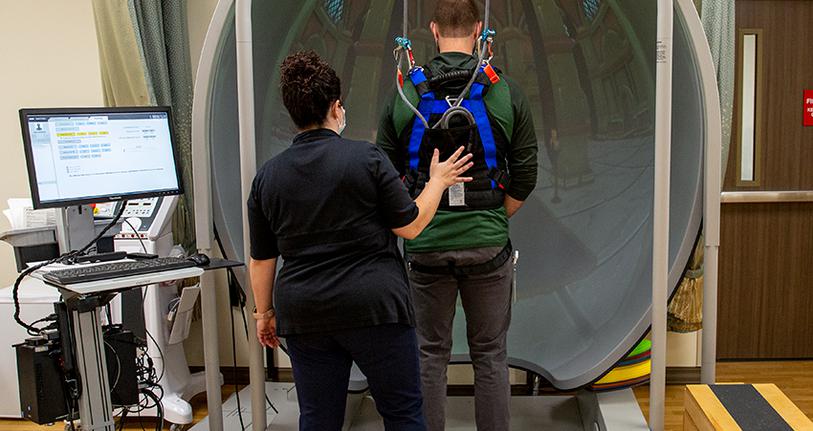Vestibular Rehabilitation Services

Our Audiology and Physical Therapy departments lead our vestibular rehabilitation team. Our staff is committed to providing evaluation and treatment services for patients with dizziness and balance disorders and to coordinate intervention to meet our patient’s needs.
We are pleased to offer the service of CHARTR VNG/ENG computer-based videonystagmography/ electronystagmography system at our facility. This system was acquired to address the increasing incidence of patients we see with complaints of dizziness and balance disorders. We are confident we can make a significant contribution to the difficult process of diagnosing and treating these patients. Vestibular Rehabilitation is an exercise/movement approach for the rehabilitation of persons suffering from imbalance, dizziness and vertigo associated with vestibular pathology. Symptoms include a person’s impaired ability to move about in his or her environment and can result in a disability that affects function, quality of life, and employment status. Treatment goals include decreasing dizziness, increasing balance function, and improving general activity level. Vestibular disorders are common and can affect people of all ages.
Vestibular Rehab is open to patients of all ages
The program features:
- Specially trained multidisciplinary staff of Audiologists and Physical Therapists
- One-on-one time with our therapists
- Comprehensive evaluation
- Physical therapy treatment
- ENG, VNG and hearing evaluations
Clinical Outcomes
We utilize a clinical outcomes program to measure efficacy of treatments and functional/therapeutic outcomes. This information allows physicians, payers and employers to compare our outcomes with national data norms. Our mission is to provide clinical excellence and high quality service while managing the cost of therapy.
Causes
Vestibular deficits may be caused by lesions in the central nervous system including brainstem/cerebellar lesions, stroke, or vertebrobasilar disease. Peripheral lesions of the inner ear including neuritis or labyrinthitis, acoustic neuromas, Meniere’s disease or Benign Paroxysmal Positional Vertigo (BPPV) are also known causes of dizziness and balance issues. The most common peripheral disorder, BPPV, is a mechanical disorder of the inner ear involving debris which has collected in the semicircular canals, resulting in brief periods of vertigo and nystagmus related to head position change.
Treatment
Vestibular Rehabilitation incorporates two successful methods of treatment for BPPV: Canalinth repositioning techniques (the Epley or Semont head maneuvers), and Brandt-Daroff exercises, to mechanically move debris out of the semicircular canals. Studies show up to 80% cure rate following the head maneuvers – often after one or two treatments, and a 95% success rate for the exercises when performed 3 times daily for two weeks. Vestibular Rehabilitation is also directed at treating impairments in gaze and postural stability, disequilibrium, motion intolerance and physical deconditioning due to vestibular disorders. Treatment is customized for each patient based on his or her specific impairments and functional limitations. Treatments may be used for patients with peripheral and central dysfunction.
A physician’s referral is required for Vestibular Rehabilitation.
Location(s)
Phone Numbers
-
Vestibular Rehabilitation
262.656.3270